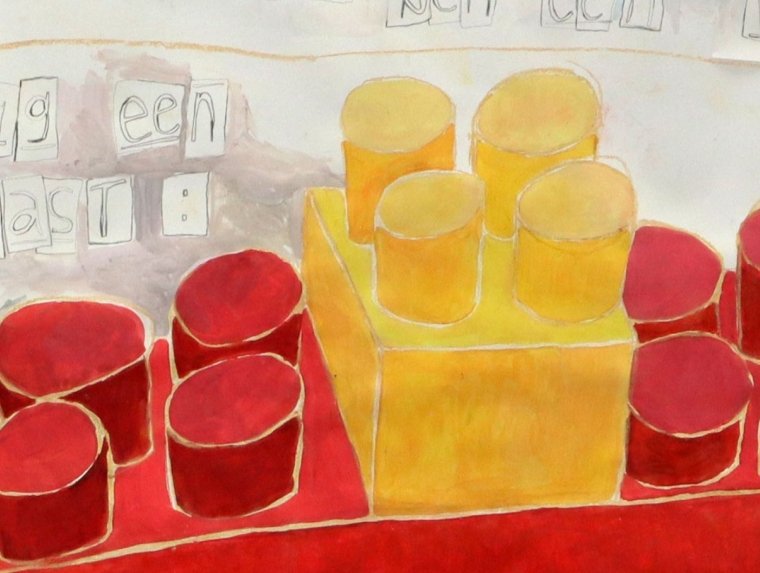A resigned, somewhat older figure with closed eyes lifts up a howling dog. Its pointed snout eloquently expresses its sorrow. 'I am the dog that has been lifted up' is embroidered in clumsy lettering under the man, who is drawn in charcoal. Childlike, you might say. There is also a booklet in which circles (plates?) are a recurring motif in a story about food. It starts breezily, but gradually you start to feel more and more uneasy. For instance, mum cooks her own food in a separate pan, and the awareness of the actions required to eat becomes ever more compelling. "We eat everything up don't we, brother/sister, because we are good eaters!" The perspective changes, from child to adolescent. How much are you allowed to eat? "You need to start watching what you eat." Eating issues, you think as a visitor.
The unease is there in everything, above and between Vera Wolsink's graduation presentation, like a choking cloud of graphite dust. Wolsink grew up in the Achterhoek region, and out of a rather oppressive childhood she developed a formal language that, on the one hand, lets the child speak and on the other hushes or reprimands that same child. It expresses itself in a certain clumsiness in the manipulation of the materials but also in poetic sentences.
The work is about growing up in fits and starts, and those bumps in the road are reflected in the work's design. There are little portraits of children being wound up. Stains and fingerprints deliberately not cleaned away. It is raw, it is what it is. Booklets in a print run of one, produced by an unsteady hand. A large drawing of Duplo bricks is about identity, what you are taught when you are small, absurd assumptions and how you can resist them. Wolsink uses text as a cold counterpart to the childlike. The resistance is sometimes ironic. When does a body count as masculine? "I am carrying a wardrobe: I am a man", it says in scrawled writing under the Duplo bricks. "I spent a long time trying to find my own voice and its value", Wolsink explains. "For a long time I denied that I wanted to write, because writing is more confronting than drawing. Moreover, it didn't fit with my rules of what art is allowed to be." In this presentation, she has given her own symbolism a voice and words, however painful they may sometimes be.
Author: Inge Pollet, curator and poet

